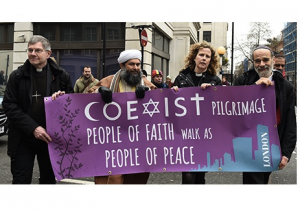TOLERANCE & SOLIDARITY .
An article from the Office of the United Nations High Commissioner of Human Rights
A “Faith for Rights” initiative launched at a recent gathering of faith-based and civil society actors from around the world aims to unite religious communities of various faiths to counter discrimination and religious-based violence through a shared objective to promote human rights and to uphold the freedom of religion or belief.

“Our objective is to foster the development of peaceful societies, where diversity is not just tolerated but fully respected and celebrated,” UN High Commissioner for Human Rights Zeid Ra’ad Al Hussein said in a video message to participants at the two-day meeting hosted by the UN Human Rights Office in Beirut.
“Religious leaders, with their considerable influence on the hearts and minds of millions of people, are potentially very important human rights actors,” said Mr. Zeid.
Building on the 2012 Rabat Plan of Action that laid out religious leaders’ core responsibilities in countering incitement to hatred, the Beirut Declaration (pdf) expands those responsibilities to the full spectrum of human rights. It calls on believers of all faiths to join hands and hearts in articulating ways in which they can stand together in defending fundamental rights against discrimination and violence.
Sheikh Maytham Al Salman, a religious leader and rights defender from Bahrain, urged religious leaders and faith-based organizations to assume leading roles in countering hate campaigns targeting particular religious groups. “Religious hostility has risen to alarming stages,” he said.
(continued in right column)
How can different faiths work together for understanding and harmony?
(continued from left column)
Linked to the Beirut Declaration are 18 Faith for Rights commitments (pdf) to uphold human rights, including pledges to avoid invoking “State religion” in order to justify discrimination against any individual or group, to ensure gender equality and minority rights, to refrain from oppressing critical voices and to engage with children and youth.
The UN Special Rapporteur on the freedom of religion or belief Ahmed Shaheed said he was concerned about the explicit targeting of youth “by those who would prey on young minds.” He called on religious leaders to pay particular attention to the vulnerability of young people subjected to hate speech.
“Youths look up to religious leaders for guidance, mentoring, support and advice. Therefore there is a need to engage with those communities at a very early age and provide a mind-set that is tolerant, broad-minded and has respect for others,” said Mr. Shaheed. “It is important to go beyond the human rights council chamber out into the field and to engage people and ensure we develop solidarity and cross-community collaboration to mobilize people to support the freedom of religion or belief.”
Ibrahim Salama, chief of the UN Human Rights Treaties Branch, hailed the Beirut Declaration as a rights-based call to people of all faiths around the world to promote peaceful societies based on mutual respect.
“Rather than focusing on theological and doctrinal divides, the Beirut Declaration favours the identification of common ground among all religions and beliefs to uphold the dignity and worth of all human beings,” he said.
(Thank you to Böðvar Jónsson of Akureyri, Iceland, the CPNN reporter for this article)